Great discussions on the suspicious nature of society with data experts at the BankenForen Conference IT- & Cybersecurity in the financial industry
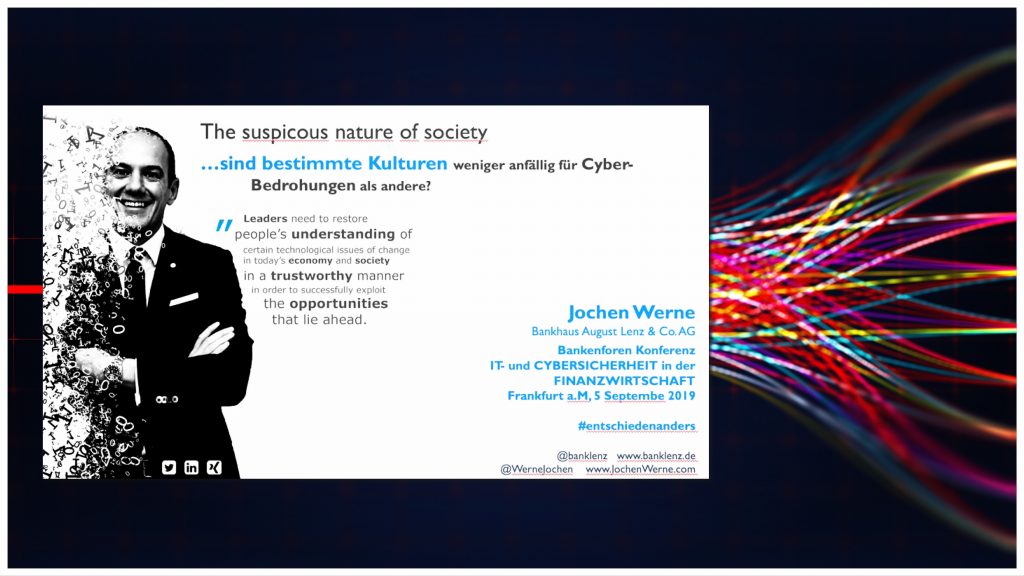
Details HERE
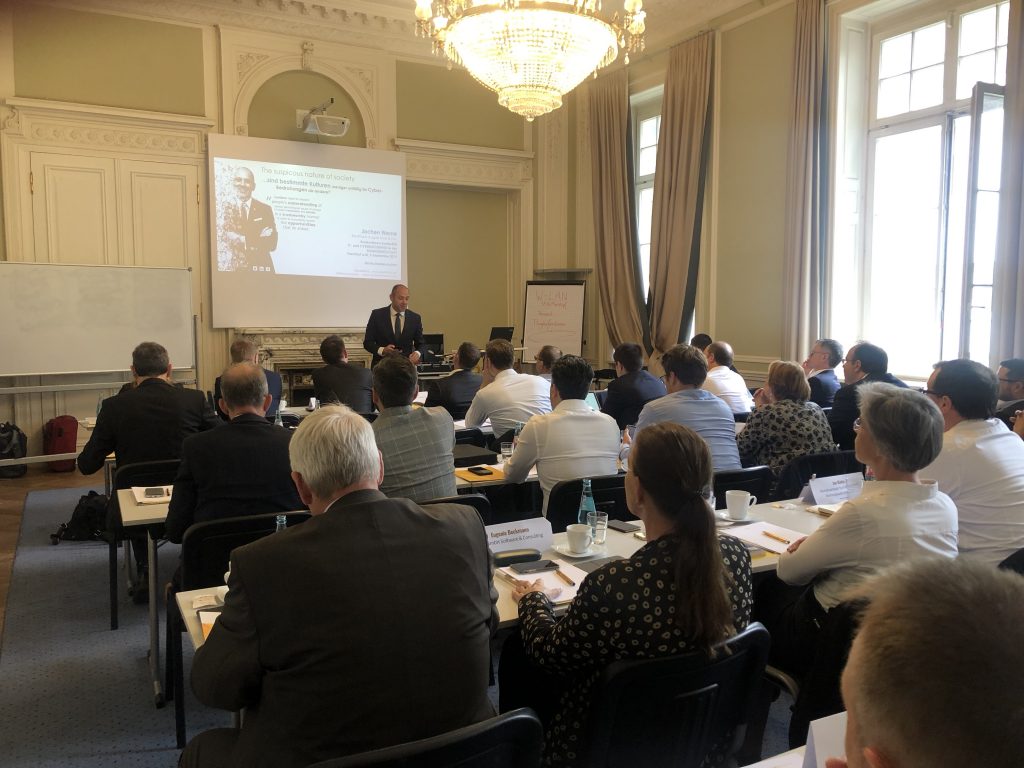

Great discussions on the suspicious nature of society with data experts at the BankenForen Conference IT- & Cybersecurity in the financial industry

Details HERE

Inspiring discussions with Michael Kaiser, Head of Department for Financial Institutions at the Office for Data Protection of the German State of Hesse & Ralf Heim, Co-Founder of Fincite.
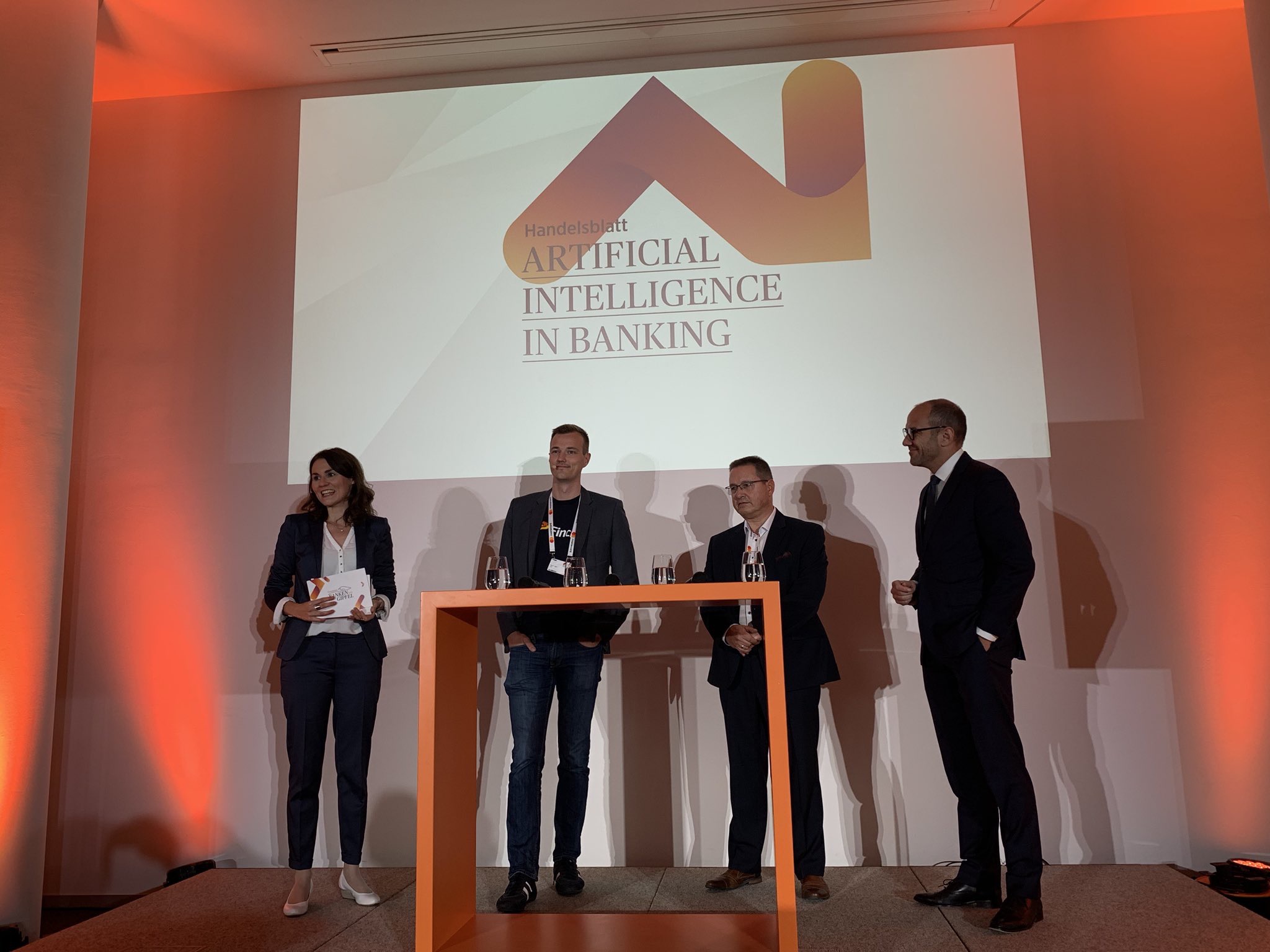
Finance Journalist at Handelsblatt Katharina Schneider greatly moderated the panel: “Chances & Risks of #Technology – Can data protection and artificial intelligence be reconciled?”
Details HERE
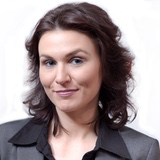
by Katharina Schneider – Handelsblatt, 21 August 2019 –
“It has been inspiring discussing with Katharina Schneider about AI and the future of the financial sector and being quoted in her article among other experts as Prof. Andreas Dengel (DFKI), Dirk Elsner (DZ Bank) and Nils Beier (Accenture) . Read the original article here“
Jochen Werne
Frankfurt The interplay between artificial intelligence and the financial sector in Great Britain will soon be very vivid: from 2021, the portrait of Alan Turing will adorn the new 50 pound notes. The scientist is known for his early research on computer technology. (translated with DeepL.com)
Read the original article here
It has been pleasure being guest author for the DIGIPRAKTIKER, Finanz Colloquium Heidelberg.
Author: Jochen Werne, Director Business Development, Product Management, Treasury and Payment Services at Bankhaus August Lenz & Co. AG
I. Introduction
The only constant in history was, is and remains change. Gutenberg’s invention of the printing press in 1450 was a milestone on the timeline of human development. Today we still take note of this invention, which was considered an innovation at that time, but we have long lived surrounded by smartphones and cloud applications, in which we can store the most private information and retrieve it from anywhere in the world. Today’s change is being driven by a veritable digital revolution.
Digital change already has fundamental consequences for individuals and their lifestyles, but it is developing its full potential when it comes to interacting with our social environment. In times of smart robotics and maturing systems in relation to artificial intelligence, the question arises again and again what role humans play on the stage of these technologies. Is he …
Read the full article by clicking here and being forwarded to the DigiPraktiker
25. JULY 2019 BY JULIANE WAACK – KEYNOTE BY Jochen Werne

For the opening keynote of our ec4u virtual conference Digital Thoughts on May 23rd, Jochen Werne, Director Marketing & Authorised Officer at Bankhaus August Lenz, talked about opening up to the digital transformation. It turns out, what we associate with technology and what it actually offers are often two completely different things.
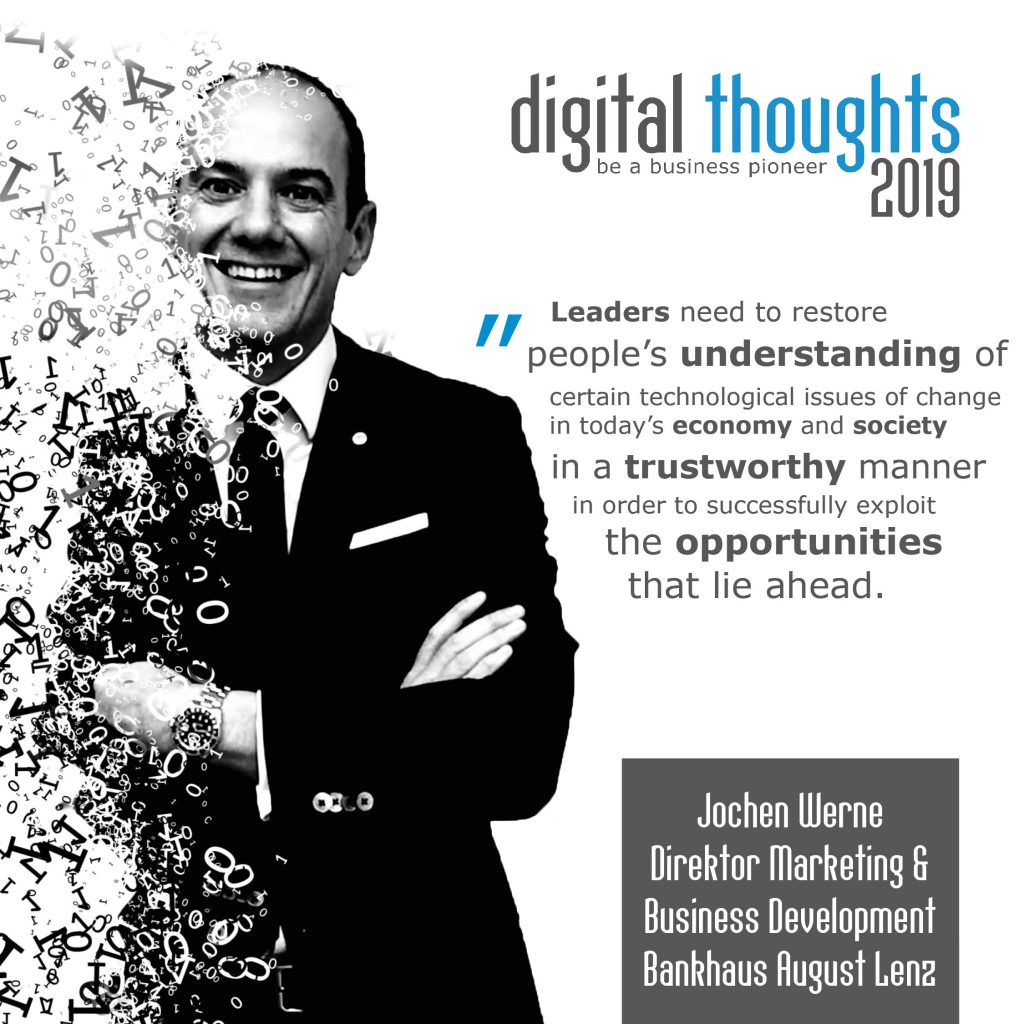
„Companies and people need to participate actively in the transformation. We need to move. It’s impossible to be a passive participant in the transformation.“
J. Werne
Author: Jochen Werne
First published in German at LinkedIn Pulse on July 20, 2019. Please find article and sources in this link. Publication in English language pleas find below
Fyodor Mikhailovich Dostoyevsky, one of the most important writers of the 19th century, impressively describes in his works the great existential and spiritual conflicts in which mankind was caught at the dawn of modernity. Not only his observations during the turbulent times of the upheaval of the Russian Empire in the 19th century, but also his personal experiences are an essential part of his work.

At the age of 28 and at the beginning of a promising career as a writer, Dostoevsky was sentenced to four years in a Siberian prison camp. The reason for this was his participation in meetings of the Petraschwezen, an intellectual circle that spoke out against tsarist despotism and serfdom. In his novel, “The House of the Dead”, which also describes Dostoyevsky’s own experiences in Siberian captivity, he formulates the sentence that was later much quoted: “Money is coined liberty”. The sentence describes the vital relevance of the possibility of a free exchange of goods in an unfree environment – and this through coined cash money.
More than 150 years have passed since the first publication of the work. Europe needed to go through the age of Enlightenment, the experiences of two world wars and a long cold war to become a peaceful and very liberal place for its citizens. A place which is putting the dignity and freedom of the individual first.
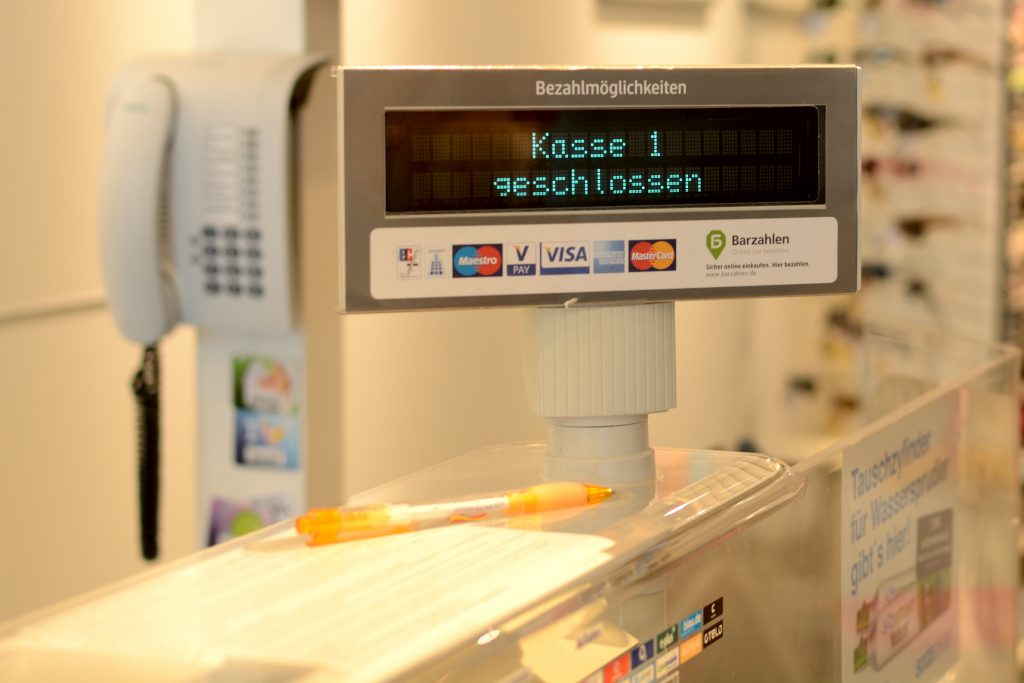
The freedom in our payment options has also multiplied thanks to technological progress. It is part of our everydays life to pay the morning croissant at the bakery, the new monthly ticket for the subway or even the use of public toilets – even without cash. Technological progress, the smartphone revolution and also our user behaviour made this evolution in payments possible. “Digital payments” have become part of our progressive society. However, the aspect of not having money physically tangible sometimes entails interesting and also unwanted aspects.
Like Dostoevsky, we also live in a time of extreme social, economic and political upheaval. An age in which exponential technology developments, industries and business models are changing radically and countries competing for dominance in areas such as artificial intelligence. It is a time when transformation is the new normality and an agile corporate culture is the key to success. In these times, for many it became clear that, “Everything that can be digitized will be digitized.” And thus the question inevitably arises whether this also applies to the first “Instant Payment” solution humans invented, one of the earliest and most sustainable achievements of civilization – cash.

If we look at Germany, cash is still one of the most popular payment methods and – culturally speaking – will probably remain for quite some time to come. According to a survey by the Bundesbank, 88 percent of German citizens continue to regard cash as their preferred means of payment. This cultural imprint can certainly also be traced back to modern history and the personal experiences of the Germans with their money. Beginning with the traumatic experience of hyperinflation during the Great Depression of 1923 and the resulting deep-rooted German understanding of the importance of a central bank independent from politics.
A painful experience, which states even today – like Venezuela – live through again and again and whose causes are often identical. In Reinhard and Rogoff’s bestseller book “This time is different”, this phenomenon is brilliantly explained using an analysis of 800 years of international economic history.
The positive image of (cash) money in Germany was impressively advanced after the end of the 2nd World War. From the currency reform of 1948 and the beginning of the economic miracle with 40 D-Mark, which every German was allowed to hold physically in his hands, to the 100 D-Mark welcome money at the reunification in 1989. These personal experiences paired with a consistently brillant independent work by the German Bundesbank – which always gave the population the feeling of having a strong, stable and secure own currency – are all German experiences, which were literally “obvious” and shaped the cultural reference of the country and its citizens.

The current freedom of our payment options is certainly good, as long as we consumers are free to decide which means of payment we pay with. Discussions about a possible restriction of citizens’ freedom of choice, for example through the abolition of cash, regularly call on intellectuals to take a warning position. The poet Hans Magnus Enzensberger, for example, has the following opinion on the subject of “restriction”: “Those who abolish cash abolish freedom”. Also former Deutsche Bundesbank board member Carl-Ludwig Thiele said at a conference in 2015: “Abolishing cash would hurt consumer sovereignty — the free choice of citizens about their payment instruments“ and “Government agencies do not have the right to tell citizens how they should pay.”
Having “physical power of disposal” over money, i.e. holding the banknote in one’s hands, immediately establishes a much stronger relationship for the value of something than a number on a display. More than ten years ago, the US scientists Raghubir and Srivastava in their essay for the “Journal if Experimental Psychology: Applied” described that the degree of abstraction often poses a problem when it comes to means of payment. They found a correlation between the indebtedness of individuals and the use of credit cards.
In Germany, the trend towards digital payment became apparent for the first time last year. In this period consumers in the stationary retail sector spent more money on checking and credit cards than in cash, as the trade research institute EHI recently announced.
However, this does not mean that customers will soon only pay by card or smartphone, the experts emphasized at the same time. Three-quarters of all retail purchases continue to be settled in cash. When it comes to the highly sensitive issue of “money”, many consumers continue to find it difficult to trust the comprehensive healing promises of an omnipresent digital world.
In order to ensure that cash and book money continue to be equally available, the players involved in the cash cycle, such as CIT companies like Prosegur, ATM operators like IC-Cash, banks like Bankhaus August Lenz et al., are working concentrated to make the provision of cash at all locations even more efficient and cost-effective. Both the providers of cash solutions and those of digital solutions experiment therefore with the latest blockchain and AI technologies to reach the before mentioned goals.
Especially in extreme scenarios, such as catastrophes or other failures of a digital infrastructure due to cyberattacks, natural events or simply technical failure, it becomes clear how cash – by its very nature – proves to be actually the most robust payment method. Ultimately, it is not tied to electricity, digital infrastructures, passwords or other technical features – it is simply available. An interesting recent anecdote occurred in Sweden, which is one of the most advanced countries in cashless payment. A country where even the traditional church collection is now equipped with a card reader. At the Bråvalla music festival 2014, for example, the memory chips on the admission tickets went on strike. Thousands of thirsty fans sat on dry land and had to write out promissory notes for their drinks by hand. An experience that can be observed again and again when paying at the checkout, when the magnetic stripe of a card or simply the card reader does not work and the views of the people standing around in the queue are impatiently looking at the payer and trying to catch a glimpse of the name on the card of the supposedly non-solvent unlucky fellow.
In an interview with Rheinische Post in February 2017, Klaus Müller, head of the Federal Association of Consumer Groups (Bundesverband der Verbraucherzentralen), said “Cash is data protection in practice”. He added: “Unbarred figures leave traces of data that can be used commercially to create a consumer profile. This data may be illegally “fished” by third parties.” Now Müller points to nothing new here and opponents of cash, use the argumentation to underline that the supposed anonymity of cash can be used for illegal business and transactions and that the suppression of cash stands above the protection of privacy. But since the first publication of the interview, the introduction of the EU General Data Protection Regulation (GDPR), the recently imposed $5 billion fine against Facebook for the Cambridge Analytica scandal and similar events, the sensitivity of the European population with regard to data protection and privacy has grown substantially.
In the closing sentence of his speech at the Cash Symposium 2018 of the Deutsche Bundesbank, the former judge of the German Federal Constitutional Court, Prof. Dr. Udo Di Fabio, underlined the probably most important point in the current discussion about cash. He said that in principle it is “not to be underestimated” that every citizen has the souvereignity of the free disposal of his money – of his personal “exchangeable assets”. He further added that this is particularly true when “financial privacy” is considered legally imperative. In other words, a society whose entire assets would be managed in digital form only, could also exercise only limited individual control over its money and would have to ask itself, “whether the state would be entitled via its central bank to carry out a controlled devaluation through negative interest rates, accounting discounts or fees on credit balances”. Prof. Di Fabio further points out that this would then not only be a property encroachment, but as a result possibly also the imposition of a special levy, which is permitted in the German legal system only under narrow conditions.
For young Fjodor Mikhailovich Dostoyevsky the conversion to book money in the Siberian prison would have meant the withdrawal of his individual sovereignity over money, so that he would not have had any more the fortune of using cash for the exchange of goods and other things. He describes the quintessence of this situation as follows: The suffering of prisoners who don’t have money is 10 times greater.
Thus, it is reasonable to assume that the intellectual serious discussions about cash and civil liberty rights would delight Dostoyevsky, with his experiences in an unfree society.
Our open and liberal society is characterised by the fact that we have and continue the discussion about “Coined Liberty 2.0” at this level.
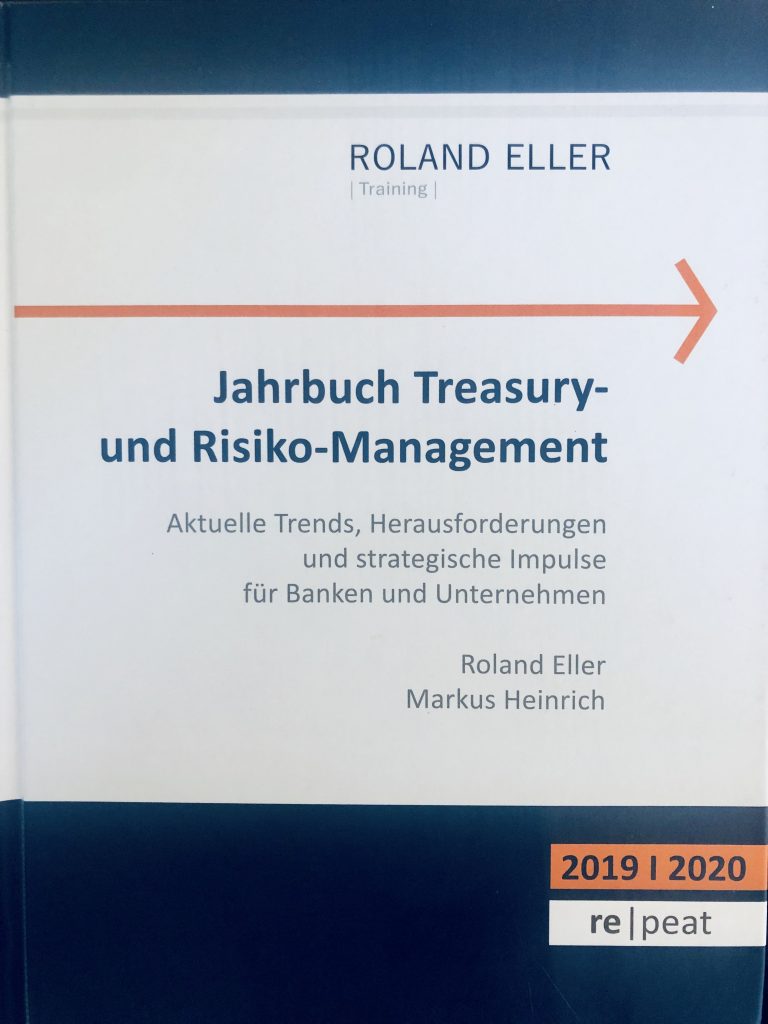
Co-Author: Jochen Werne
Chapter: Information Overload
Find out more and buying options here
Content extract
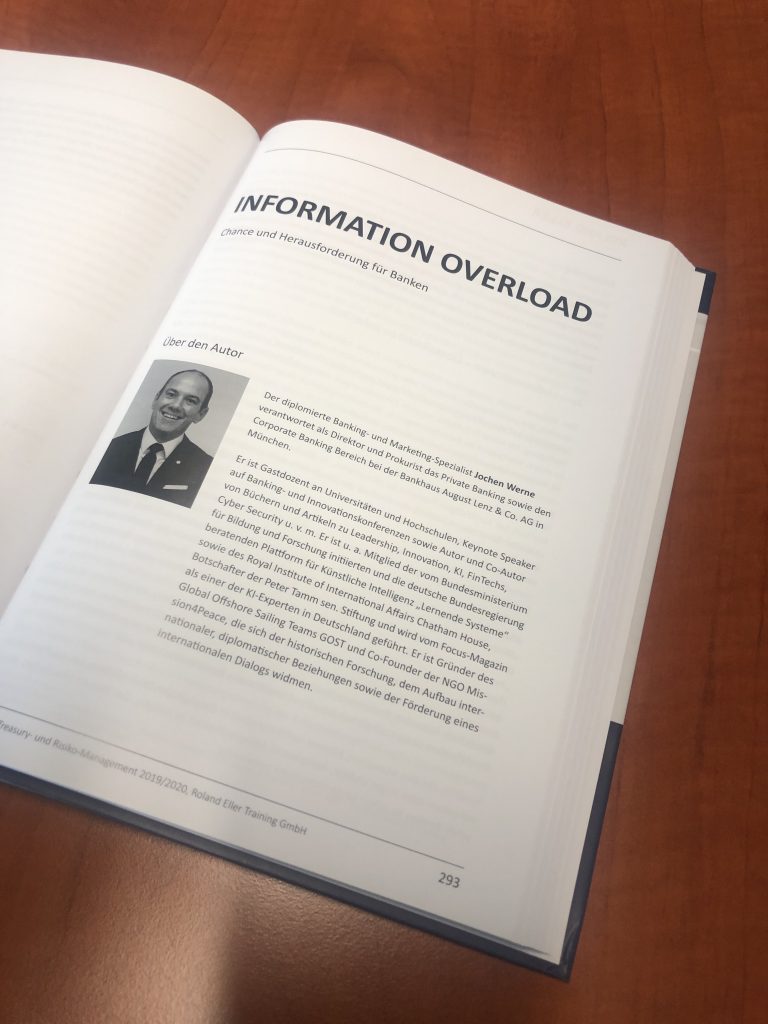
Bitte hier klicken für DETAILS und ANMELDUNG ZUM EVENT
Source: Diplomatic Council
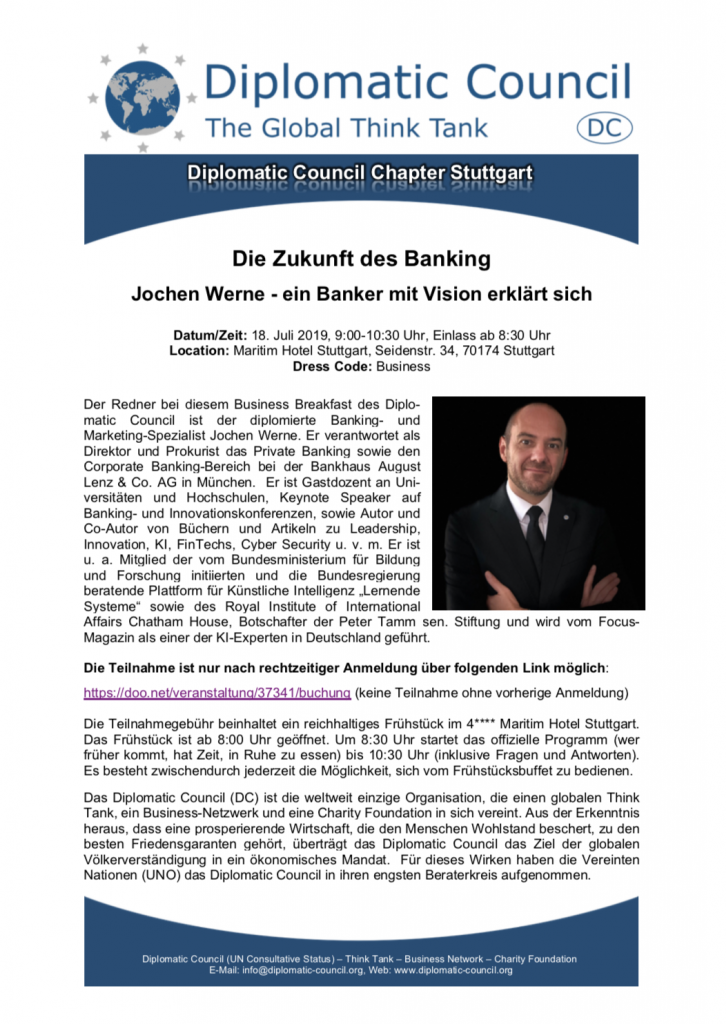
The speaker this morning is Jochen Werne, a graduate banking and marketing specialist. As director and authorized signatory, he is responsible for private banking and corporate banking at Bankhaus August Lenz & Co. AG in Munich. He is guest lecturer at universities and colleges, keynote speaker at banking and innovation conferences, author and co-author of books and articles on leadership, innovation, KI, FinTechs, Cyber Security and much more. He is a member of the platform for artificial intelligence “Learning Systems” initiated by the Federal Ministry of Education and Research and advising the German Federal Government as well as of the Royal Institute of International Affairs Chatham House, ambassador of the Peter Tamm sen. foundation and is listed by Focus-Magazin as one of the AI experts in Germany. He is the founder of the Global Offshore Sailing Team GOST and co-founder of the NGO Mission4Peace, which is dedicated to historical research, building international diplomatic relations and promoting international dialogue.
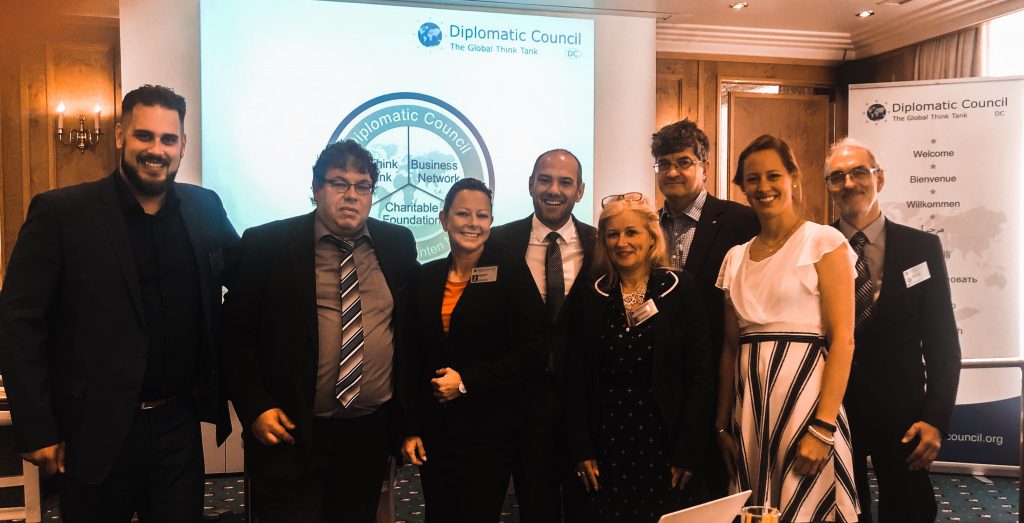
The participants will also get to know the Diplomatic Council (DC) this morning. It combines a global think tank, a business network and a charity foundation in a unique organization with consultative status at the United Nations. Stephanie Stoerk, Chapter Director DC Stuttgart, explains what distinguishes the Diplomatic Council from all other networks and what advantages it offers its members.
Breakfast is open from 8:30 am. At 9:00 a.m. we start our official program (whoever comes earlier has time to eat in peace), which lasts until 10:30 a.m. (including questions and answers). In between there is always the possibility to eat from the rich breakfast buffet.
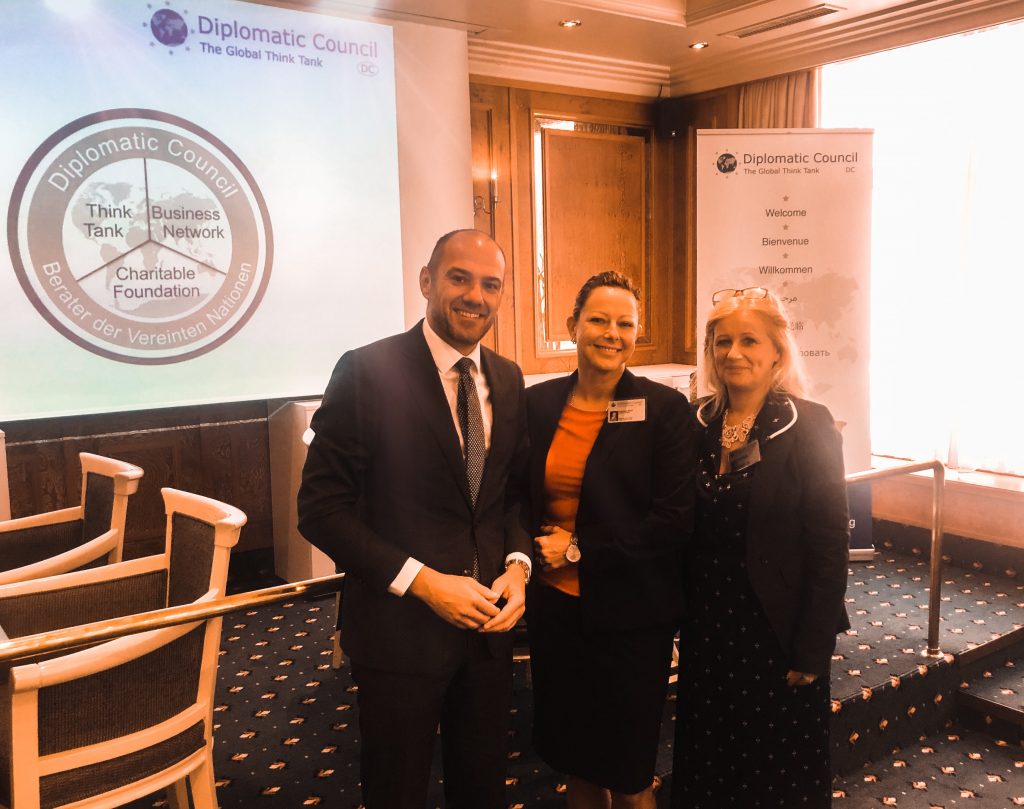
PROGRAMM
Der Redner an diesem Morgen ist der diplomierte Banking- und Marketing-Spezialist Jochen Werne. Er verantwortet als Direktor und Prokurist das Private Banking sowie den Corporate Banking Bereich bei der Bankhaus August Lenz & Co. AG in München. Er ist Gastdozent an Universitäten und Hochschulen, Keynote Speaker auf Banking- und Innovationskonferenzen, sowie Autor und Co-Autor von Büchern und Artikeln zu Leadership, Innovation, KI, FinTechs, Cyber Security u. v. m. Er ist u. a. Mitglied der vom Bundesministerium für Bildung und Forschung initiierten und die deutsche Bundesregierung beratende Plattform für Künstliche Intelligenz „Lernende Systeme“ sowie des Royal Institute of International Affairs Chatham House, Botschafter der Peter Tamm sen. Stiftung und wird vom Focus-Magazin als einer der KI-Experten in Deutschland geführt. Er ist Gründer des Global Offshore Sailing Teams GOST und Co-Founder der NGO Mission4Peace, die sich der historischen Forschung, dem Aufbau internationaler, diplomatischer Beziehungen sowie der Förderung eines internationalen Dialogs widmet.
Darüber hinaus lernen die Teilnehmer an diesem Morgen das Diplomatic Council (DC) kennen. Es verknüpft einen globalen Think Tank, ein Business Network und eine Charity Foundation in einer einzigartigen Organisation mit Beraterstatus bei den Vereinten Nationen. Stephanie Stoerk, Chapter Director DC Stuttgart, informiert, was das Diplomatic Council von allen anderen Netzwerken unterscheidet und welche Vorteile sich daraus für die Mitglieder ergeben.Das Frühstück ist ab 8:30 Uhr geöffnet. Um 9:00 Uhr starten wir unser offizielles Programm (wer früher kommt, hat also Zeit, in Ruhe zu essen), das bis 10:30 Uhr andauert (inklusive Fragen und Antworten). Es besteht zwischendurch jederzeit die Möglichkeit, sich vom reichhaltigen Frühstücksbuffet zu versorgen
Jochen Werne, Director Marketing & Business Development at Bankhaus August Lenz, explains in his keynote address how we can shape the future from the innovations and topics of the past and why digitization must be thought of not only technologically but also culturally.
Jochen Werne, Direktor Marketing & Business Development beim Bankhaus August Lenz, erläutert in seiner Keynote, wie wir aus den Innovationen und Themen der Vergangenheit in der Gegenwart die Zukunft gestalten können und warum Digitalisierung nicht nur technologisch, sondern auch kulturell gedacht werden muss.
Artificial intelligence is the new buzz word of the financial industry, says Jochen Werne. In view of the rapid pace of technological development it is becoming a source of hope for the banks – and rightly so, writes the author. After all, banks have an enormous amount of data at their disposal. Despite all the digitalisation and areas of application of AI, Werne sees the chance for a renaissance of consulting as a link between people and the technical world. Red. Bank und Markt
Read the full article in the new June 2019 edition of BANK und MARKT here
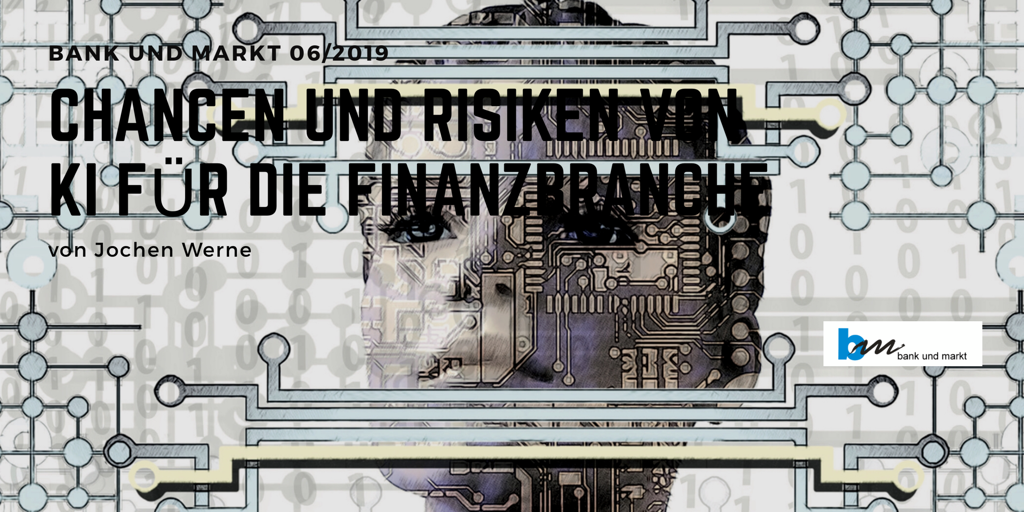
German: Künstliche Intelligenz ist das neue Buzz-Wort der Finanzbranche, sagt Jochen Werne. Angesichts der rasanten technologischen Entwicklung wird sie zum Hoffnungsträger für die Banken – zu Recht, meint der Autor. Schließlich verfügen Banken über einen enormen Datenschatz. Trotz aller Digitalisierung und Einsatzbereiche von KI sieht Werne jedoch die Chance auf eine Renaissance der Beratung als Bindeglied zwischen Mensch und technisierter Welt. Red.